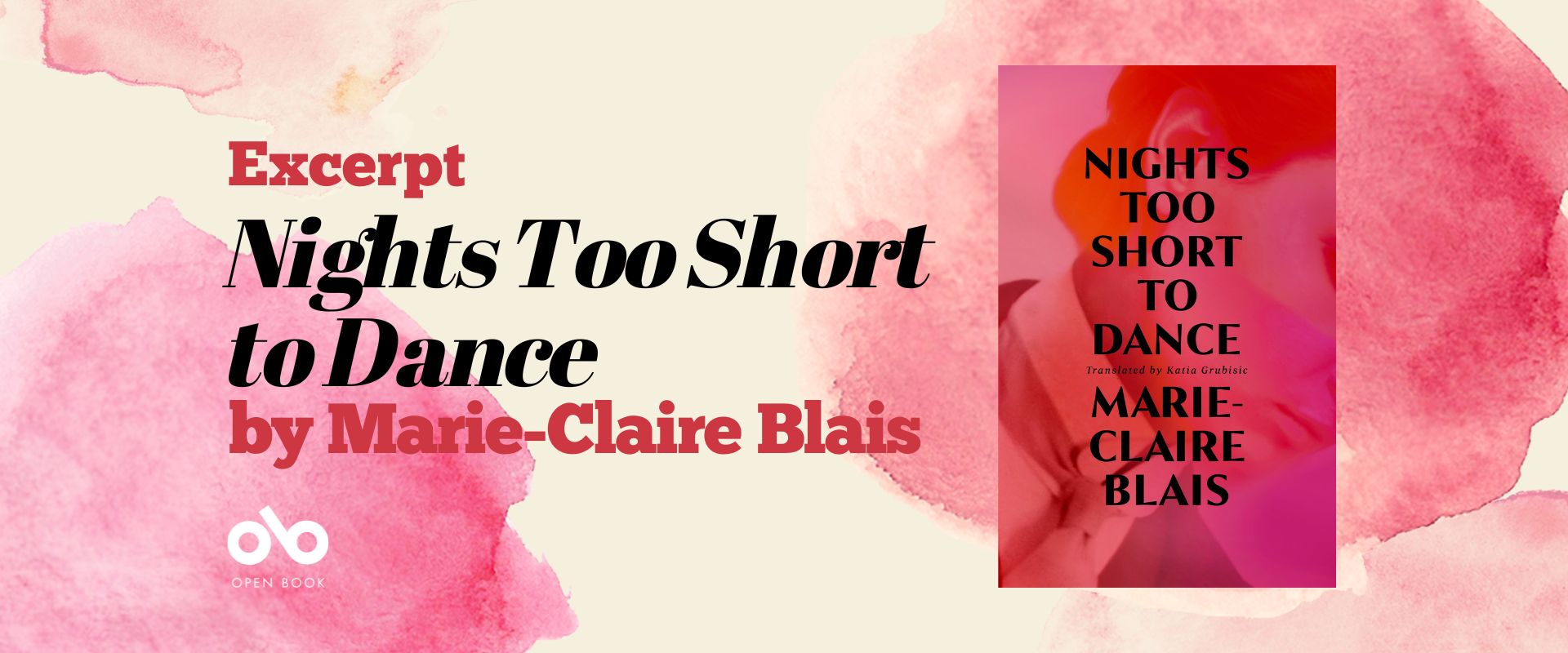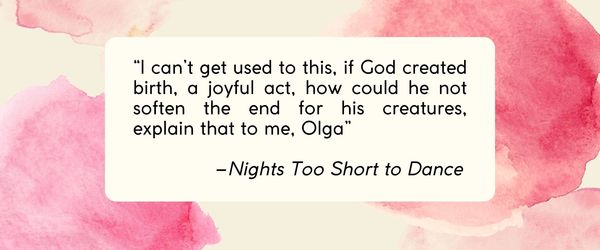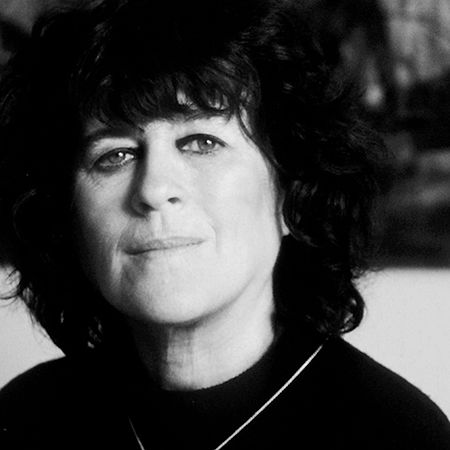Excerpt from Nights Too Short to Dance by the Late French Canadian Literary Icon Marie-Claire Blais
Marie-Claire Blais was known for her fiery writing, her passionate representation of the French Canadian experience, and her fearless literary voice. Over 70 years, she became an icon of Quebec, Canadian, and queer literature, writing novels, plays, poetry, short story collections, journalism, and screenplays. Blais passed away in 2021. Her longtime partner, the American-born writer and painter Mary Meigs, passed away in 2002. Before Blais' death, The New Yorker called her "one of the most distinctive and original living writers of fiction".
Though Blais is gone, her legacy remains, and now readers can enjoy a new, posthumously published novel in her distinctive voice, Nights Too Short to Dance (Second Story Press, translated by Katia Grubisic).
Following René, a pianist dealing—and not dealing—with the effects of aging, Nights Too Short to Dance is a sensual, art-loving, full-throated celebration of a life given to wonder and beauty, artistic decadence and the paradoxically straight-laced dedication it demands.
René simultaneously bristles at and appreciates the care from his nurse, Olga, and dresses up in case he is visited by one of his many friends or lovers. Readers meet these characters, who are characters in the best sense of the word: writer Johnie, musician Doudouline, theologian Polydor, painter l’Abeille, and Gérard, a dedicated epicurean.
As the snow falls, they reminisce about everything they've lived through: heartbreak and loss, triumph and passion. Stonewall, AIDs, bigotry, legal battles, victories and defeats in the face of intolerance. Nights Too Short to Dance is at once both a torch-passing story and one of urgency and timeliness, and we're excited to share an excerpt from it today, courtesy of Second Story Press.
Excerpt from Nights Too Short to Dance by Marie-Claire Blais:
Part One
Solitary Angels
Don’t move, I’ll lift up your pillow so you can look out the window at the falling snow, let it come, René said, let the snow bury us all, his voice high, a distant squeak, Olga, Natasha, Tania, whatever your name is, let it snow, ’tis the season, I won’t be around for much longer anyway, a few nights at most, my dear girl, could you help me take off these goddamn pajamas, if I have visitors today I want to look good, I want to be elegant like in the old days, I used to play piano in cabaret clubs, bars that were mostly for women, maybe a few men now and then, rarely, I used to play waltzes there in my fine clothes, I charmed them all, Tania, I’m telling you, is snowing like Moscow, the Russian nurse said, same as Moscow, never stops, children walk back from school reciting Pushkin, and take off my dressing gown too, René ordered, where’s my shirt, the bright white one, and my black jacket, the blue tie, get them from the closet, I want to dress as if I were going out, I might well get a visit from my mistresses, they might come, Olga, what mistresses, Madame, what are you talking about, don’t call me Madame, René said, don’t forget that I’m a man, I look like a woman, especially to you who knows everything about me, too much perhaps, you’ve been looking after everything my body needs, I wish I could look after myself but my arms and my legs are so weak, I can’t get used to this, if God created birth, a joyful act, how could he not soften the end for his creatures, explain that to me, Olga, why did he make me a woman when I’m actually a man, what do you think, I think you are a woman in natoor, Olga said, you’re saying it wrong, René replied, it’s nature, I should teach you to improve your pronunciation, the misfortune of the life of my parents, Olga said, was living under dictatorship where God does not reign, so jealous are the dictators, Olga said, do you feel more comfortable, Madame René, is it time to listen to your music, great music every morning, I know, I am bringing your phone, and you will listen while the snow is falling, you’ll have to read what’s written on the screen, René said, my eyes are going, I can’t read anymore, just yesterday I was dancing with the girls, my soul was full of joy, what else is there if we lose joy, who are you telling, Madame René, when I go home in evening to prepare dinner for my husband, the Bulgarian, he beats me because he doesn’t want me to stay with you, Madame, he says bad words, like you are not the best patient, I know, leave him, my dear girl, leave him, René said, come live with me, I’ll treat you well, except I won’t be around much longer, oh, don’t cry, I know men have a steely heart, woe to them, I wasn’t one of those, I’ve always treated women with respect because I understand them, your husband is an ignorant man, my dear Olga, how can you live with such a man, a sadist, really, come live with me, it’s just that I’m on my way out, the path of no return, how ugly it is, how horrible, I’ll give you my house and all the snow outside, is it cold in here or is it my health failing a little more every hour, it is little bit cold, Olga said, I will make fire in the fireplace, it will warm up your apartment, Madame René, the water maybe was cold when I washed your face, your neck, your breasts, I don’t have breasts, René said, you know that, what are you talking about, Olga, I’m built like a man, I’m sturdy, I don’t have breasts, please don’t talk about me like that, all I’m missing is one thing, one body part, all it took was for me to be virile in my head and a strange, rather attractive man was born, there I was, women believed in my manhood, and, I must say, they loved me, though there were abuses, on the part of the women I dated, I mean, they suspected that the manly ornament was only in my head, sometimes life is just a game, you know, I’ll explain it to you one day when you’ve left your brutal Bulgarian, it’s no life at all to be beaten by a man, a real man, and not feel ashamed, you’re still a child, René said, and I feel sorry for you, so what’s going on with my party clothes, Olga, can you tell me, Olga, Tania, Natasha, why God made such pitiful conditions for humankind, he just didn’t think about it, it’s that simple, René said, if he had given it any thought, we wouldn’t even be here. Neither you nor I, not the Bulgarian who beats you, no, there would nothing, not a stone, if you think about it, that’s what we do, we bring forth calamities, I’m telling you, Olga, calamities.
I suppose it could be, René thought, that my Russian nurse is not Russian at all, that she’s lying, that she knows neither Moscow nor Pushkin, we have no choice, we have to lie, it’s all games and pretenses, so often we are mere projections, lying just means you have more imagination than everybody else, it’s a mantle of glory, René thought, turning his face toward the screen his nurse held out to him so he could listen to the music, tell me what it says on the screen, I recognize the composer, Italian, right, René said, as if dazzled by the sound, yes, Madame, it is Italian compooser, composer, René said, composer, don’t mumble like that, it’s grating, you know I don’t like it, are you really from Russia, tell me about that some other time, read me the rest, it says he died at twenty-six in abject poverty, Madame, very sad, the story of all these musicians, it is young woman who conducts this orchestra in men’s clothing, evening clothes, how you like them, Madame René, she could look like you in younger way, you were certainly irresistible, the nurse said, in suits from good tailors, I was, René said, but the life of a playboy is never very long, I’ve dragged it out enough and look where I am now, old and dying, basically alone in the world, oh that is not true, the nurse said, I am here, and the telephone is always ringing for you, you have many friends, Madame René, and they come from everyplace to see you and hear you because you speak to them so beautifully of music, of love, especially of love, René said, the women I’ve been with, I’ve always made them dream, we can’t live without dreams otherwise everything is trivial, it’s banal, I’m telling you, come, slowly, bring the phone closer, as René listened to the sublime strains of the morning’s music, her body was exhausted by a constant, vicious physical ache, her limbs were on fire, inside her nothing was at peace, except her ear, ever attentive, as she listened, the music wrapped her up in softness despite her pain, it came from heaven, though heaven didn’t exist, she thought, those voices together, the countertenor and contralto, sweet imperfection, the very incompleteness of that union was what made it beautiful, the masculine and the feminine wrapped together in a surprising interleaving of sounds, cries of joy and sudden deep plaint, René thought, sometimes the man had the voice of a woman, sometimes the contralto borrowed a man’s voice, those sustained, subterranean sounds, René listened and her soul was exalted, she had no body at all, Madame René is listening to religious music, Olga muttered, it was boring, couldn’t they put something else on, but René could only hear the countertenor and his bewitching supplication to God, there was something so carnal about it somehow that it brought tears to her eyes, she told herself she was listening to the voices of her own beloved ones, the very voices of the irreconcilable loves of all the poor humans who misunderstand each other yet who are one, who form one whole like this Pergolesi duet, the single, unified chorus of infinite disparity that this man, this woman, these virtuoso voices were expressing in their splendor.
Too often the choir was a supplicant, broken and castigated the moment its members claimed their individuality, that’s what had happened that June night in New York, or in the early morning, rather, as the bars were opening, or closing, young gay men still hanging around at the door and on the street as the sun came up, there were lots of young Black men and very young Hispanic men, several white men, a whole retinue of youth was out there and that morning, that day, that night the police raided everything, everywhere, René couldn’t forget the Stonewall riots, she’d been there, yes, she thought, she was everywhere there was resistance, that was her struggle too, in the Village, the night of June 28, the police said it was just a routine raid but it was violence coming right at us, they put us up against the wall and beat us, they threw us out of the bar, and that sparked our revolution, a flame that would never go out, we were going to wipe it all clean, the stigma of that year, 1969, that night in June, the police were barricaded inside the bar and outside we were armed with bricks, with whatever we could find in the street, sticks and shovels, we waited for them and when we were all out in the street together it was their turn to be shaking there inside the building, the very place they had come to persecute us, yes, it was finally their turn, we were tired of being classified as mentally ill even by intelligent doctors and psychiatrists, and all the religious prejudice too, there was no one to defend us so we had to defend ourselves, alone, in San Francisco, in Los Angeles, there was a long history already of activism to stand up for our rights, and that day, June 28, we still mark it today, that was the beginning of our freedom, that night we learned to protect ourselves, it was the start of a revolution, René thought, since that iconic day there have been marches, constant demonstrations, the world is going to change, René thought through the great sweep of the morning music, I was with Lali in New York, we were always together, little brother and I, united in the struggle, Lali was my brother, but now we only talk to each other on the phone, those struggles aren’t over, now that René was listening to his music, Olga, the Russian nurse, was cleaning up the room, there is so much mess around you, Madame René, Olga was saying, you can’t get better in mess like this, there are books everywhere that you can’t read, more and more with time, who told you I want to get better, René shouted, who told you that, instead of marching down in the street like I used to, I used to be an activist and now here I am nailed to a bed I can’t get out of, this is how the monstrous god debases the human spirit, there were so many memorial marches, it made me so happy, René thought, and I was always up ahead with the transgender crowd, I had to be there, out front, leave the mess, dear child, René commanded, her voice as masculine as the countertenor droning on from the phone, but her own voice didn’t carry as well, though René had been a good singer back then, in those days of silly, provocative songs or soft romantic tunes in the bars and the cabarets, when women would dance together to the rhythm of her voice.
_______________________________________________________
Excerpt taken from Nights Too Short to Dance by Marie-Claire Blais, and translated into English by Katia Grubisic, published by Second Story Press. Copyright Marie-Claire Blais, 2023. Reprinted with permission.
Your CanLit News
Subscribe to Open Book’s newsletter to get local book events, literary content, writing tips, and more in your inbox
Marie-Claire Blais was a giant of the French literary scene and a queer icon. She authored over thirty books which won her the Médicis Prize, the W.O. Mitchell Literary Prize, four Governor General’s Literary Awards, and two Guggenheim Fellowships. Born in Québec City, she spent much of her life in Key West, Florida, where she died in 2021.
Katia Grubisic is a writer, editor, and translator. Her work has appeared in Canadian and international publications. She has been a finalist for the Governor General’s Literary Award for translation and the A.M. Klein Prize for Poetry, and her collection of poems What if red ran out won the Gerald Lampert award for best first book.





